A Comprehensive Analysis of the World of Tourism: Impacts Explored
VerifiedAdded on 2023/06/09
|8
|2251
|62
Essay
AI Summary
This essay provides an overview of the tourism industry, defining it as activities involving travel and temporary stays outside an individual's usual environment for leisure, business, or other purposes. It highlights the rapid growth of global tourism and the challenges it faces, including globalization, human resource issues, and economic factors. The essay discusses the positive impacts of tourism, such as increased tax revenue and job creation, as well as negative impacts like overcrowding and seasonal employment. It also examines the environmental effects, including resource misuse and pollution, alongside positive contributions to city development and nature protection. Furthermore, the analysis covers socio-cultural impacts, emphasizing the preservation of local culture and heritage, while also addressing issues like inflated prices and the seasonality of jobs. The essay concludes that tourism has both advantages and disadvantages, affecting political, economic, technological, social, cultural, and environmental aspects of a nation.
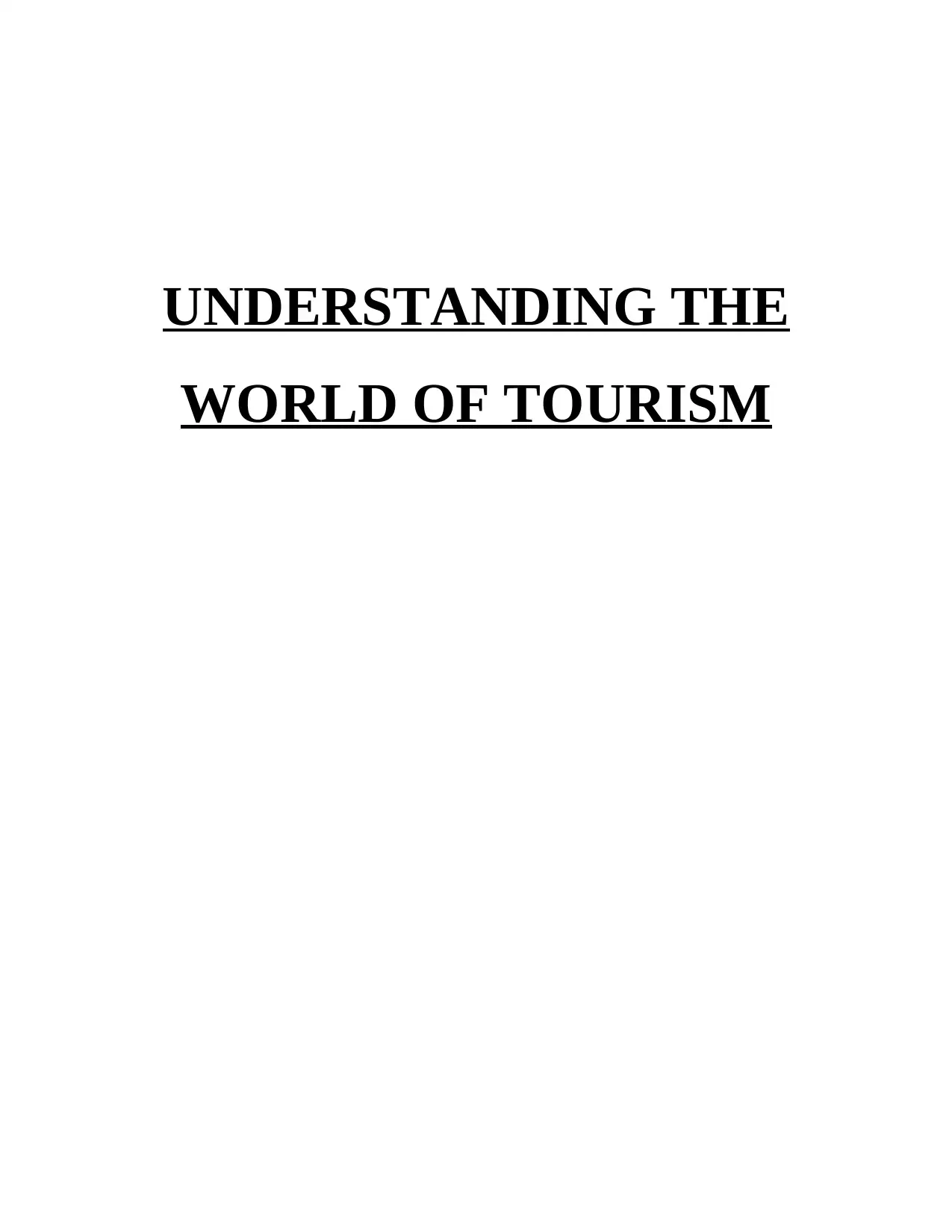
UNDERSTANDING THE
WORLD OF TOURISM
WORLD OF TOURISM
Paraphrase This Document
Need a fresh take? Get an instant paraphrase of this document with our AI Paraphraser
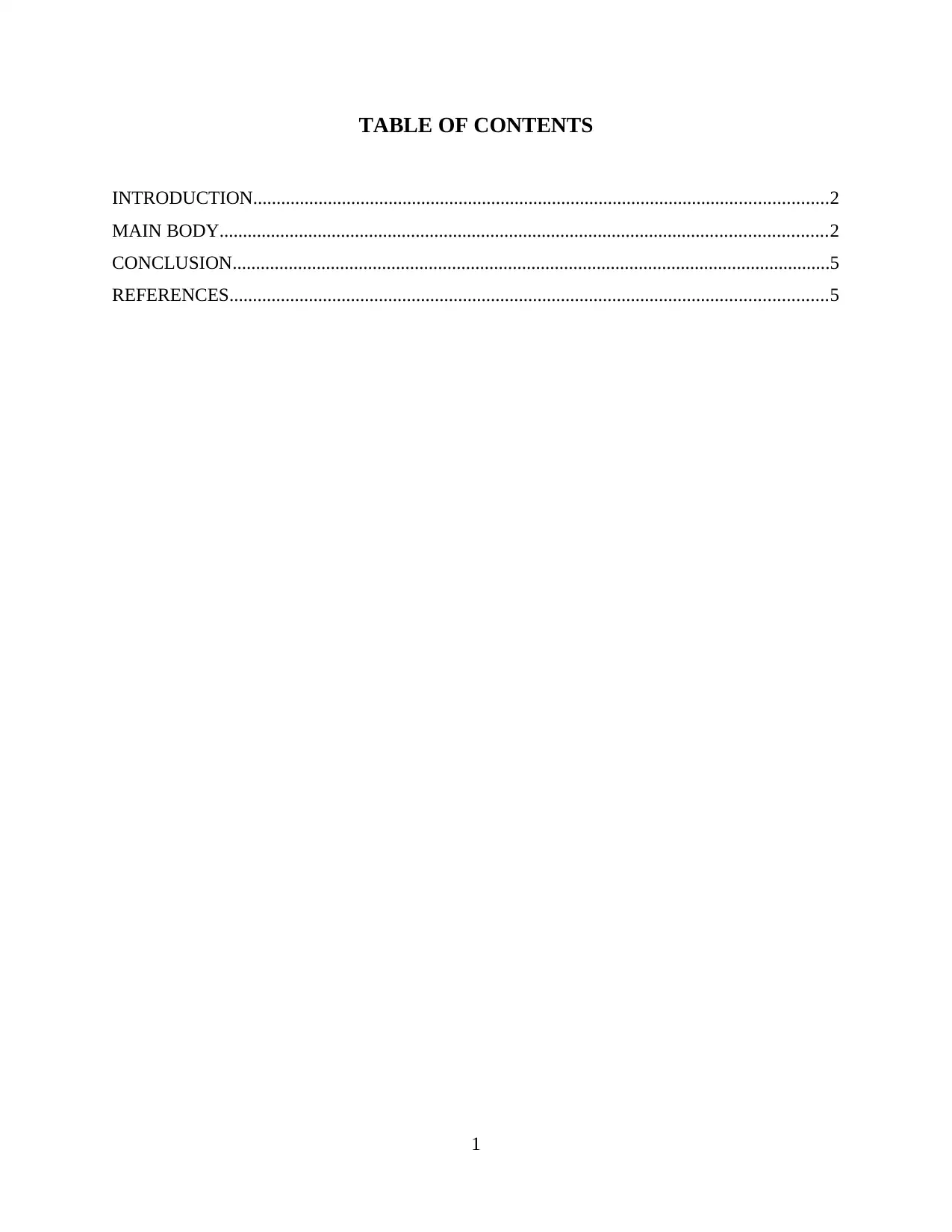
TABLE OF CONTENTS
INTRODUCTION...........................................................................................................................2
MAIN BODY..................................................................................................................................2
CONCLUSION................................................................................................................................5
REFERENCES................................................................................................................................5
1
INTRODUCTION...........................................................................................................................2
MAIN BODY..................................................................................................................................2
CONCLUSION................................................................................................................................5
REFERENCES................................................................................................................................5
1
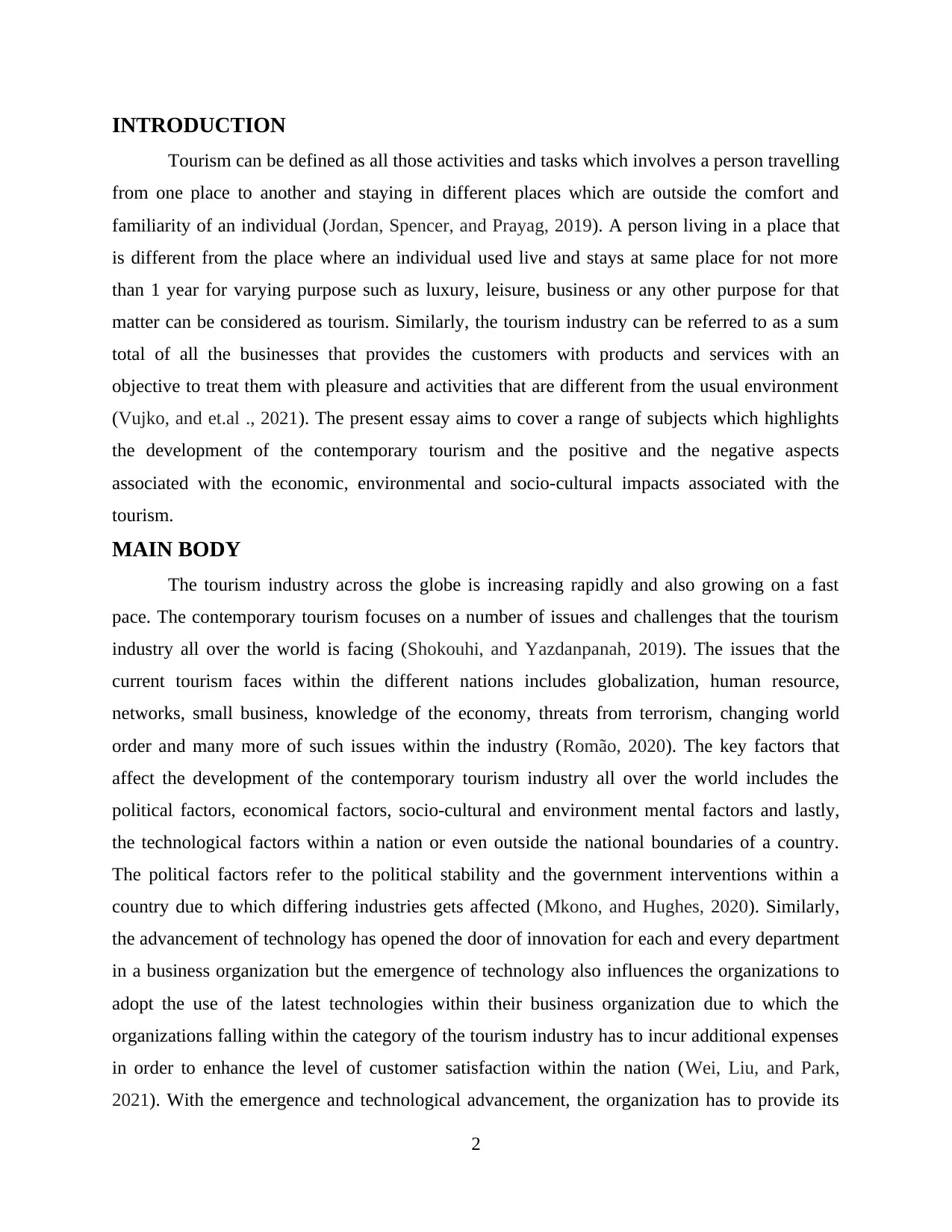
INTRODUCTION
Tourism can be defined as all those activities and tasks which involves a person travelling
from one place to another and staying in different places which are outside the comfort and
familiarity of an individual (Jordan, Spencer, and Prayag, 2019). A person living in a place that
is different from the place where an individual used live and stays at same place for not more
than 1 year for varying purpose such as luxury, leisure, business or any other purpose for that
matter can be considered as tourism. Similarly, the tourism industry can be referred to as a sum
total of all the businesses that provides the customers with products and services with an
objective to treat them with pleasure and activities that are different from the usual environment
(Vujko, and et.al ., 2021). The present essay aims to cover a range of subjects which highlights
the development of the contemporary tourism and the positive and the negative aspects
associated with the economic, environmental and socio-cultural impacts associated with the
tourism.
MAIN BODY
The tourism industry across the globe is increasing rapidly and also growing on a fast
pace. The contemporary tourism focuses on a number of issues and challenges that the tourism
industry all over the world is facing (Shokouhi, and Yazdanpanah, 2019). The issues that the
current tourism faces within the different nations includes globalization, human resource,
networks, small business, knowledge of the economy, threats from terrorism, changing world
order and many more of such issues within the industry (Romão, 2020). The key factors that
affect the development of the contemporary tourism industry all over the world includes the
political factors, economical factors, socio-cultural and environment mental factors and lastly,
the technological factors within a nation or even outside the national boundaries of a country.
The political factors refer to the political stability and the government interventions within a
country due to which differing industries gets affected (Mkono, and Hughes, 2020). Similarly,
the advancement of technology has opened the door of innovation for each and every department
in a business organization but the emergence of technology also influences the organizations to
adopt the use of the latest technologies within their business organization due to which the
organizations falling within the category of the tourism industry has to incur additional expenses
in order to enhance the level of customer satisfaction within the nation (Wei, Liu, and Park,
2021). With the emergence and technological advancement, the organization has to provide its
2
Tourism can be defined as all those activities and tasks which involves a person travelling
from one place to another and staying in different places which are outside the comfort and
familiarity of an individual (Jordan, Spencer, and Prayag, 2019). A person living in a place that
is different from the place where an individual used live and stays at same place for not more
than 1 year for varying purpose such as luxury, leisure, business or any other purpose for that
matter can be considered as tourism. Similarly, the tourism industry can be referred to as a sum
total of all the businesses that provides the customers with products and services with an
objective to treat them with pleasure and activities that are different from the usual environment
(Vujko, and et.al ., 2021). The present essay aims to cover a range of subjects which highlights
the development of the contemporary tourism and the positive and the negative aspects
associated with the economic, environmental and socio-cultural impacts associated with the
tourism.
MAIN BODY
The tourism industry across the globe is increasing rapidly and also growing on a fast
pace. The contemporary tourism focuses on a number of issues and challenges that the tourism
industry all over the world is facing (Shokouhi, and Yazdanpanah, 2019). The issues that the
current tourism faces within the different nations includes globalization, human resource,
networks, small business, knowledge of the economy, threats from terrorism, changing world
order and many more of such issues within the industry (Romão, 2020). The key factors that
affect the development of the contemporary tourism industry all over the world includes the
political factors, economical factors, socio-cultural and environment mental factors and lastly,
the technological factors within a nation or even outside the national boundaries of a country.
The political factors refer to the political stability and the government interventions within a
country due to which differing industries gets affected (Mkono, and Hughes, 2020). Similarly,
the advancement of technology has opened the door of innovation for each and every department
in a business organization but the emergence of technology also influences the organizations to
adopt the use of the latest technologies within their business organization due to which the
organizations falling within the category of the tourism industry has to incur additional expenses
in order to enhance the level of customer satisfaction within the nation (Wei, Liu, and Park,
2021). With the emergence and technological advancement, the organization has to provide its
2
⊘ This is a preview!⊘
Do you want full access?
Subscribe today to unlock all pages.

Trusted by 1+ million students worldwide
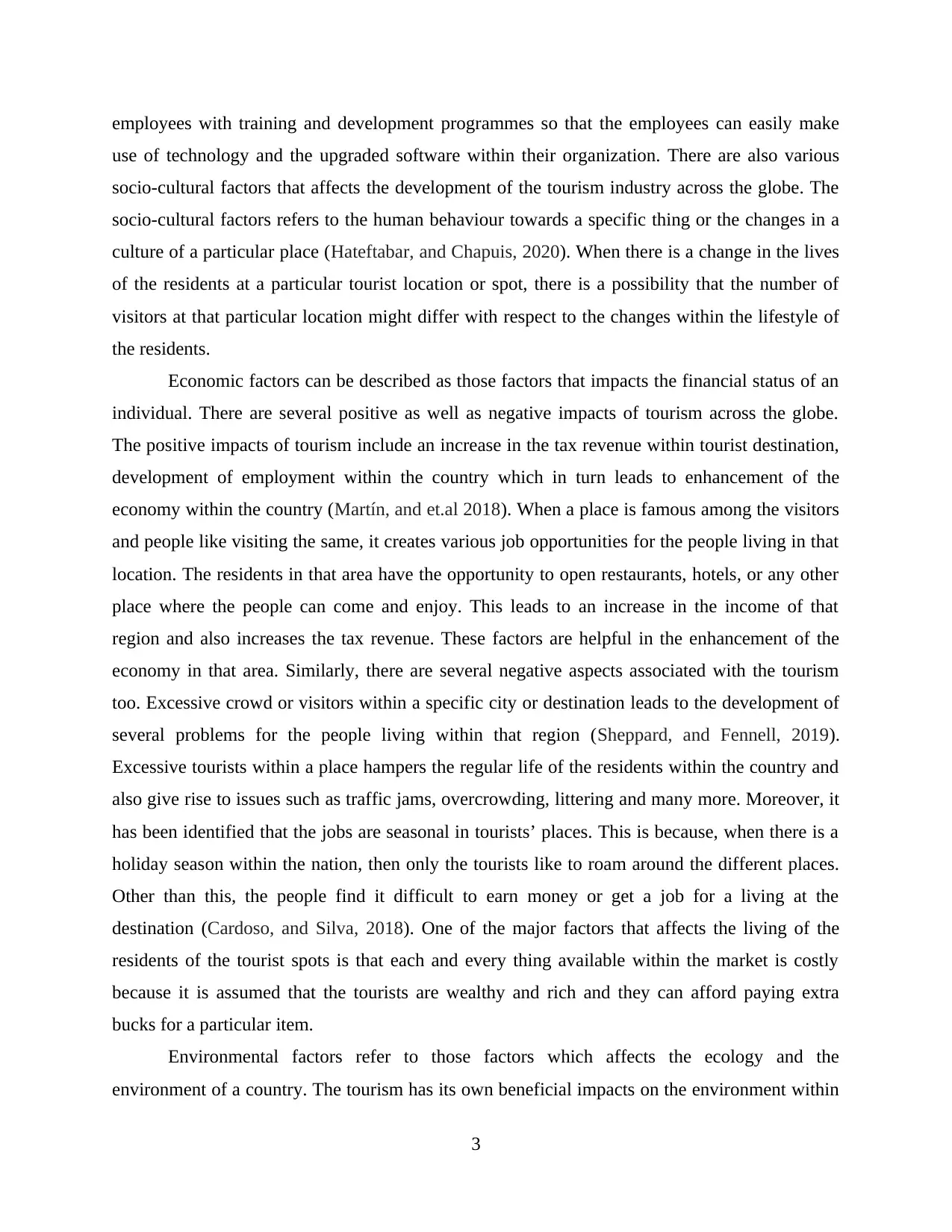
employees with training and development programmes so that the employees can easily make
use of technology and the upgraded software within their organization. There are also various
socio-cultural factors that affects the development of the tourism industry across the globe. The
socio-cultural factors refers to the human behaviour towards a specific thing or the changes in a
culture of a particular place (Hateftabar, and Chapuis, 2020). When there is a change in the lives
of the residents at a particular tourist location or spot, there is a possibility that the number of
visitors at that particular location might differ with respect to the changes within the lifestyle of
the residents.
Economic factors can be described as those factors that impacts the financial status of an
individual. There are several positive as well as negative impacts of tourism across the globe.
The positive impacts of tourism include an increase in the tax revenue within tourist destination,
development of employment within the country which in turn leads to enhancement of the
economy within the country (Martín, and et.al 2018). When a place is famous among the visitors
and people like visiting the same, it creates various job opportunities for the people living in that
location. The residents in that area have the opportunity to open restaurants, hotels, or any other
place where the people can come and enjoy. This leads to an increase in the income of that
region and also increases the tax revenue. These factors are helpful in the enhancement of the
economy in that area. Similarly, there are several negative aspects associated with the tourism
too. Excessive crowd or visitors within a specific city or destination leads to the development of
several problems for the people living within that region (Sheppard, and Fennell, 2019).
Excessive tourists within a place hampers the regular life of the residents within the country and
also give rise to issues such as traffic jams, overcrowding, littering and many more. Moreover, it
has been identified that the jobs are seasonal in tourists’ places. This is because, when there is a
holiday season within the nation, then only the tourists like to roam around the different places.
Other than this, the people find it difficult to earn money or get a job for a living at the
destination (Cardoso, and Silva, 2018). One of the major factors that affects the living of the
residents of the tourist spots is that each and every thing available within the market is costly
because it is assumed that the tourists are wealthy and rich and they can afford paying extra
bucks for a particular item.
Environmental factors refer to those factors which affects the ecology and the
environment of a country. The tourism has its own beneficial impacts on the environment within
3
use of technology and the upgraded software within their organization. There are also various
socio-cultural factors that affects the development of the tourism industry across the globe. The
socio-cultural factors refers to the human behaviour towards a specific thing or the changes in a
culture of a particular place (Hateftabar, and Chapuis, 2020). When there is a change in the lives
of the residents at a particular tourist location or spot, there is a possibility that the number of
visitors at that particular location might differ with respect to the changes within the lifestyle of
the residents.
Economic factors can be described as those factors that impacts the financial status of an
individual. There are several positive as well as negative impacts of tourism across the globe.
The positive impacts of tourism include an increase in the tax revenue within tourist destination,
development of employment within the country which in turn leads to enhancement of the
economy within the country (Martín, and et.al 2018). When a place is famous among the visitors
and people like visiting the same, it creates various job opportunities for the people living in that
location. The residents in that area have the opportunity to open restaurants, hotels, or any other
place where the people can come and enjoy. This leads to an increase in the income of that
region and also increases the tax revenue. These factors are helpful in the enhancement of the
economy in that area. Similarly, there are several negative aspects associated with the tourism
too. Excessive crowd or visitors within a specific city or destination leads to the development of
several problems for the people living within that region (Sheppard, and Fennell, 2019).
Excessive tourists within a place hampers the regular life of the residents within the country and
also give rise to issues such as traffic jams, overcrowding, littering and many more. Moreover, it
has been identified that the jobs are seasonal in tourists’ places. This is because, when there is a
holiday season within the nation, then only the tourists like to roam around the different places.
Other than this, the people find it difficult to earn money or get a job for a living at the
destination (Cardoso, and Silva, 2018). One of the major factors that affects the living of the
residents of the tourist spots is that each and every thing available within the market is costly
because it is assumed that the tourists are wealthy and rich and they can afford paying extra
bucks for a particular item.
Environmental factors refer to those factors which affects the ecology and the
environment of a country. The tourism has its own beneficial impacts on the environment within
3
Paraphrase This Document
Need a fresh take? Get an instant paraphrase of this document with our AI Paraphraser
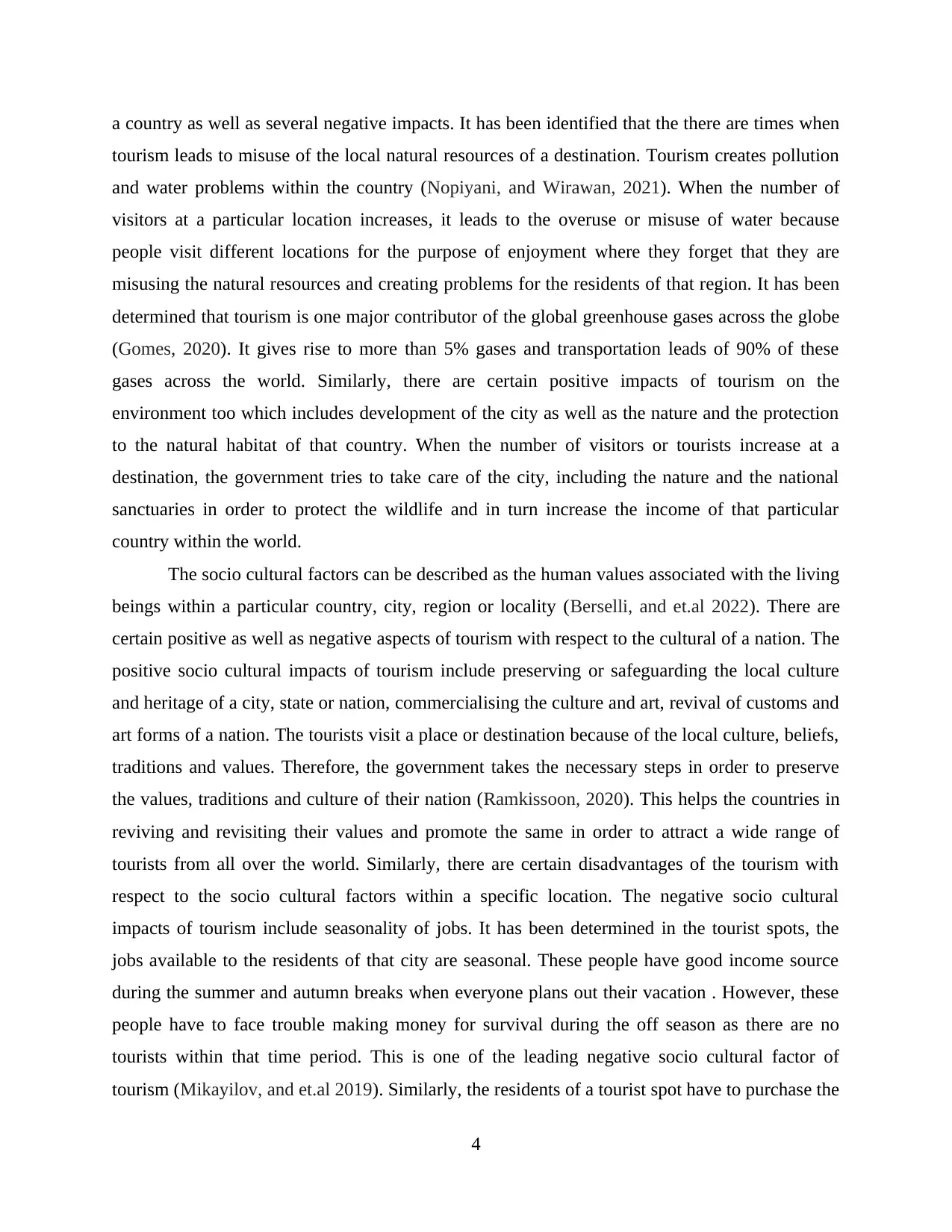
a country as well as several negative impacts. It has been identified that the there are times when
tourism leads to misuse of the local natural resources of a destination. Tourism creates pollution
and water problems within the country (Nopiyani, and Wirawan, 2021). When the number of
visitors at a particular location increases, it leads to the overuse or misuse of water because
people visit different locations for the purpose of enjoyment where they forget that they are
misusing the natural resources and creating problems for the residents of that region. It has been
determined that tourism is one major contributor of the global greenhouse gases across the globe
(Gomes, 2020). It gives rise to more than 5% gases and transportation leads of 90% of these
gases across the world. Similarly, there are certain positive impacts of tourism on the
environment too which includes development of the city as well as the nature and the protection
to the natural habitat of that country. When the number of visitors or tourists increase at a
destination, the government tries to take care of the city, including the nature and the national
sanctuaries in order to protect the wildlife and in turn increase the income of that particular
country within the world.
The socio cultural factors can be described as the human values associated with the living
beings within a particular country, city, region or locality (Berselli, and et.al 2022). There are
certain positive as well as negative aspects of tourism with respect to the cultural of a nation. The
positive socio cultural impacts of tourism include preserving or safeguarding the local culture
and heritage of a city, state or nation, commercialising the culture and art, revival of customs and
art forms of a nation. The tourists visit a place or destination because of the local culture, beliefs,
traditions and values. Therefore, the government takes the necessary steps in order to preserve
the values, traditions and culture of their nation (Ramkissoon, 2020). This helps the countries in
reviving and revisiting their values and promote the same in order to attract a wide range of
tourists from all over the world. Similarly, there are certain disadvantages of the tourism with
respect to the socio cultural factors within a specific location. The negative socio cultural
impacts of tourism include seasonality of jobs. It has been determined in the tourist spots, the
jobs available to the residents of that city are seasonal. These people have good income source
during the summer and autumn breaks when everyone plans out their vacation . However, these
people have to face trouble making money for survival during the off season as there are no
tourists within that time period. This is one of the leading negative socio cultural factor of
tourism (Mikayilov, and et.al 2019). Similarly, the residents of a tourist spot have to purchase the
4
tourism leads to misuse of the local natural resources of a destination. Tourism creates pollution
and water problems within the country (Nopiyani, and Wirawan, 2021). When the number of
visitors at a particular location increases, it leads to the overuse or misuse of water because
people visit different locations for the purpose of enjoyment where they forget that they are
misusing the natural resources and creating problems for the residents of that region. It has been
determined that tourism is one major contributor of the global greenhouse gases across the globe
(Gomes, 2020). It gives rise to more than 5% gases and transportation leads of 90% of these
gases across the world. Similarly, there are certain positive impacts of tourism on the
environment too which includes development of the city as well as the nature and the protection
to the natural habitat of that country. When the number of visitors or tourists increase at a
destination, the government tries to take care of the city, including the nature and the national
sanctuaries in order to protect the wildlife and in turn increase the income of that particular
country within the world.
The socio cultural factors can be described as the human values associated with the living
beings within a particular country, city, region or locality (Berselli, and et.al 2022). There are
certain positive as well as negative aspects of tourism with respect to the cultural of a nation. The
positive socio cultural impacts of tourism include preserving or safeguarding the local culture
and heritage of a city, state or nation, commercialising the culture and art, revival of customs and
art forms of a nation. The tourists visit a place or destination because of the local culture, beliefs,
traditions and values. Therefore, the government takes the necessary steps in order to preserve
the values, traditions and culture of their nation (Ramkissoon, 2020). This helps the countries in
reviving and revisiting their values and promote the same in order to attract a wide range of
tourists from all over the world. Similarly, there are certain disadvantages of the tourism with
respect to the socio cultural factors within a specific location. The negative socio cultural
impacts of tourism include seasonality of jobs. It has been determined in the tourist spots, the
jobs available to the residents of that city are seasonal. These people have good income source
during the summer and autumn breaks when everyone plans out their vacation . However, these
people have to face trouble making money for survival during the off season as there are no
tourists within that time period. This is one of the leading negative socio cultural factor of
tourism (Mikayilov, and et.al 2019). Similarly, the residents of a tourist spot have to purchase the
4
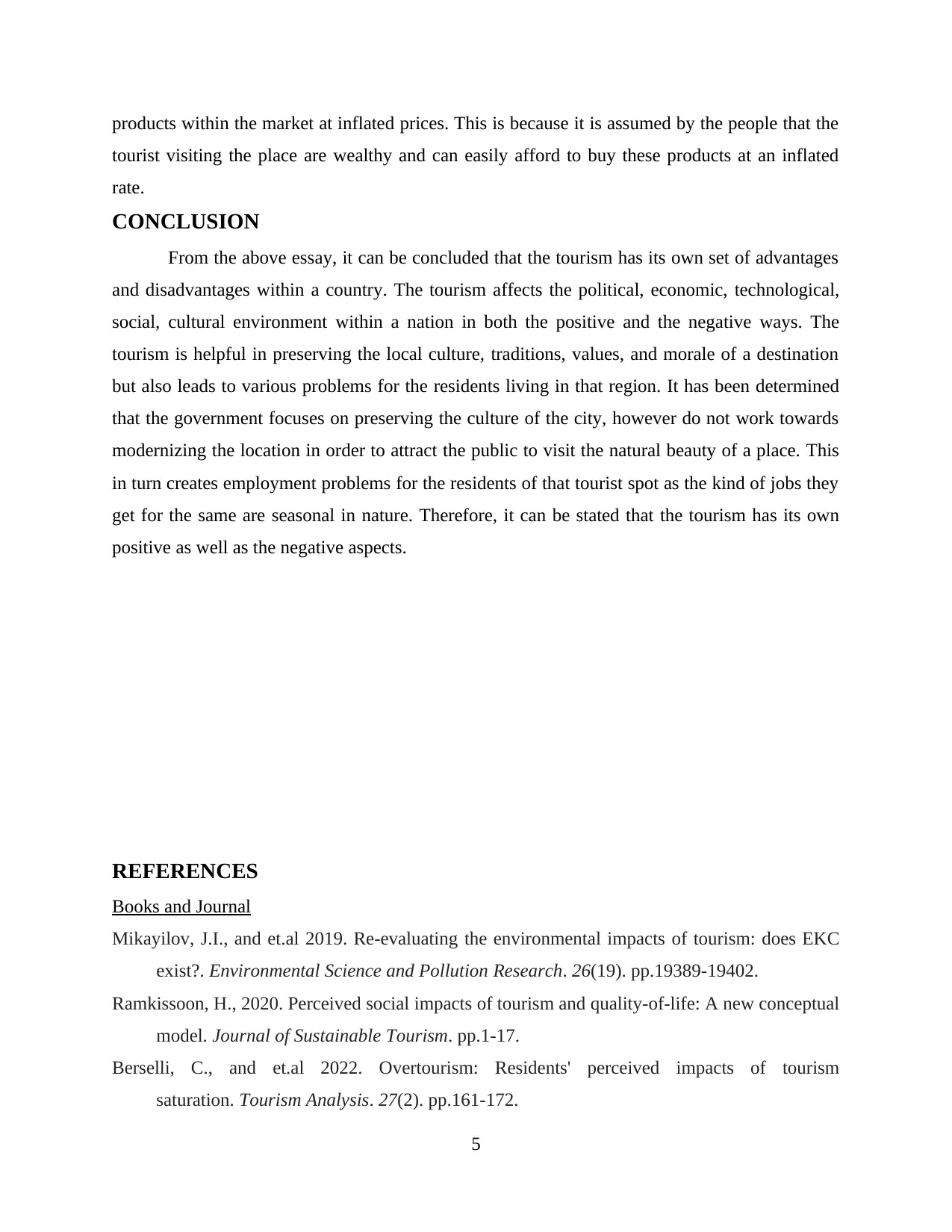
products within the market at inflated prices. This is because it is assumed by the people that the
tourist visiting the place are wealthy and can easily afford to buy these products at an inflated
rate.
CONCLUSION
From the above essay, it can be concluded that the tourism has its own set of advantages
and disadvantages within a country. The tourism affects the political, economic, technological,
social, cultural environment within a nation in both the positive and the negative ways. The
tourism is helpful in preserving the local culture, traditions, values, and morale of a destination
but also leads to various problems for the residents living in that region. It has been determined
that the government focuses on preserving the culture of the city, however do not work towards
modernizing the location in order to attract the public to visit the natural beauty of a place. This
in turn creates employment problems for the residents of that tourist spot as the kind of jobs they
get for the same are seasonal in nature. Therefore, it can be stated that the tourism has its own
positive as well as the negative aspects.
REFERENCES
Books and Journal
Mikayilov, J.I., and et.al 2019. Re-evaluating the environmental impacts of tourism: does EKC
exist?. Environmental Science and Pollution Research. 26(19). pp.19389-19402.
Ramkissoon, H., 2020. Perceived social impacts of tourism and quality-of-life: A new conceptual
model. Journal of Sustainable Tourism. pp.1-17.
Berselli, C., and et.al 2022. Overtourism: Residents' perceived impacts of tourism
saturation. Tourism Analysis. 27(2). pp.161-172.
5
tourist visiting the place are wealthy and can easily afford to buy these products at an inflated
rate.
CONCLUSION
From the above essay, it can be concluded that the tourism has its own set of advantages
and disadvantages within a country. The tourism affects the political, economic, technological,
social, cultural environment within a nation in both the positive and the negative ways. The
tourism is helpful in preserving the local culture, traditions, values, and morale of a destination
but also leads to various problems for the residents living in that region. It has been determined
that the government focuses on preserving the culture of the city, however do not work towards
modernizing the location in order to attract the public to visit the natural beauty of a place. This
in turn creates employment problems for the residents of that tourist spot as the kind of jobs they
get for the same are seasonal in nature. Therefore, it can be stated that the tourism has its own
positive as well as the negative aspects.
REFERENCES
Books and Journal
Mikayilov, J.I., and et.al 2019. Re-evaluating the environmental impacts of tourism: does EKC
exist?. Environmental Science and Pollution Research. 26(19). pp.19389-19402.
Ramkissoon, H., 2020. Perceived social impacts of tourism and quality-of-life: A new conceptual
model. Journal of Sustainable Tourism. pp.1-17.
Berselli, C., and et.al 2022. Overtourism: Residents' perceived impacts of tourism
saturation. Tourism Analysis. 27(2). pp.161-172.
5
⊘ This is a preview!⊘
Do you want full access?
Subscribe today to unlock all pages.

Trusted by 1+ million students worldwide
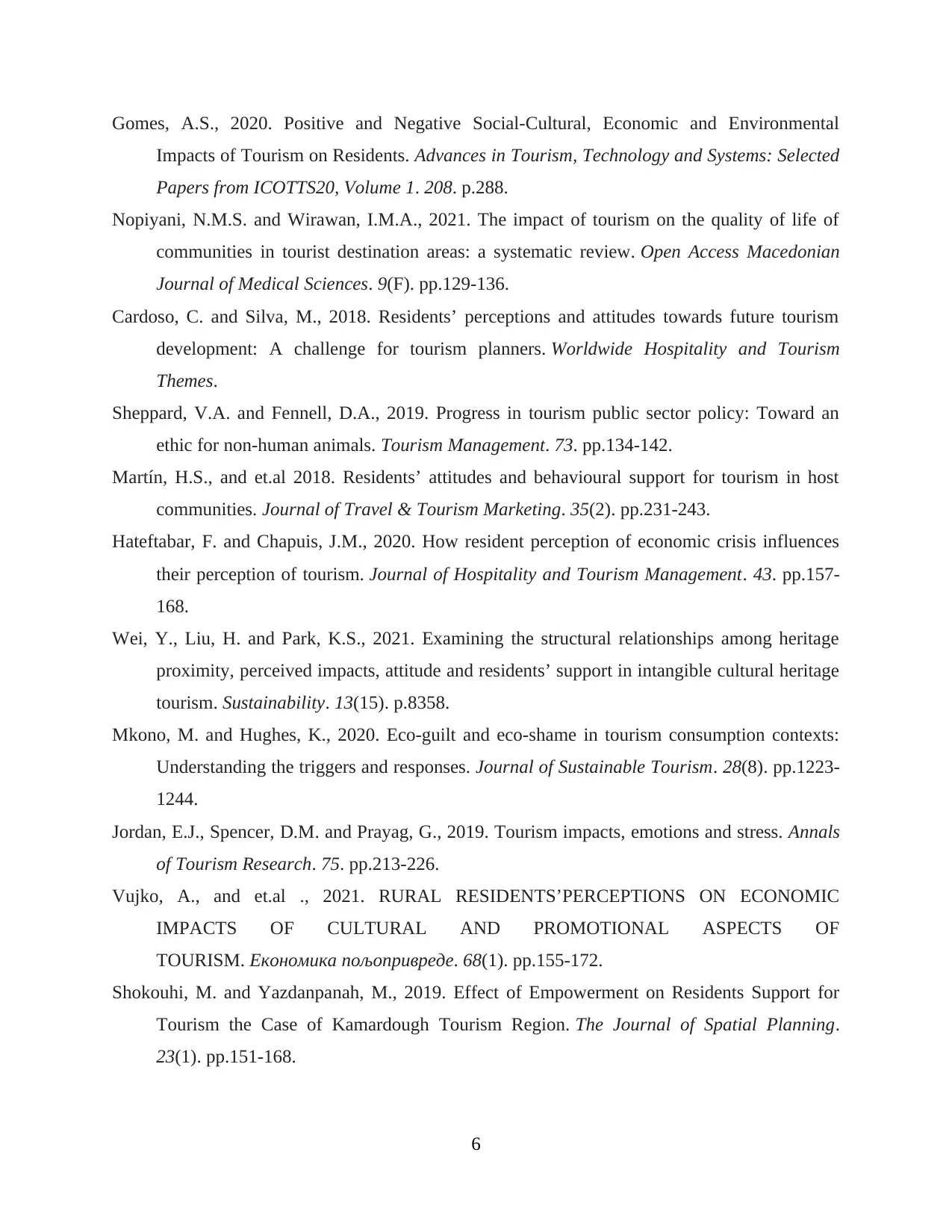
Gomes, A.S., 2020. Positive and Negative Social-Cultural, Economic and Environmental
Impacts of Tourism on Residents. Advances in Tourism, Technology and Systems: Selected
Papers from ICOTTS20, Volume 1. 208. p.288.
Nopiyani, N.M.S. and Wirawan, I.M.A., 2021. The impact of tourism on the quality of life of
communities in tourist destination areas: a systematic review. Open Access Macedonian
Journal of Medical Sciences. 9(F). pp.129-136.
Cardoso, C. and Silva, M., 2018. Residents’ perceptions and attitudes towards future tourism
development: A challenge for tourism planners. Worldwide Hospitality and Tourism
Themes.
Sheppard, V.A. and Fennell, D.A., 2019. Progress in tourism public sector policy: Toward an
ethic for non-human animals. Tourism Management. 73. pp.134-142.
Martín, H.S., and et.al 2018. Residentsʼ attitudes and behavioural support for tourism in host
communities. Journal of Travel & Tourism Marketing. 35(2). pp.231-243.
Hateftabar, F. and Chapuis, J.M., 2020. How resident perception of economic crisis influences
their perception of tourism. Journal of Hospitality and Tourism Management. 43. pp.157-
168.
Wei, Y., Liu, H. and Park, K.S., 2021. Examining the structural relationships among heritage
proximity, perceived impacts, attitude and residents’ support in intangible cultural heritage
tourism. Sustainability. 13(15). p.8358.
Mkono, M. and Hughes, K., 2020. Eco-guilt and eco-shame in tourism consumption contexts:
Understanding the triggers and responses. Journal of Sustainable Tourism. 28(8). pp.1223-
1244.
Jordan, E.J., Spencer, D.M. and Prayag, G., 2019. Tourism impacts, emotions and stress. Annals
of Tourism Research. 75. pp.213-226.
Vujko, A., and et.al ., 2021. RURAL RESIDENTS’PERCEPTIONS ON ECONOMIC
IMPACTS OF CULTURAL AND PROMOTIONAL ASPECTS OF
TOURISM. Економика пољопривреде. 68(1). pp.155-172.
Shokouhi, M. and Yazdanpanah, M., 2019. Effect of Empowerment on Residents Support for
Tourism the Case of Kamardough Tourism Region. The Journal of Spatial Planning.
23(1). pp.151-168.
6
Impacts of Tourism on Residents. Advances in Tourism, Technology and Systems: Selected
Papers from ICOTTS20, Volume 1. 208. p.288.
Nopiyani, N.M.S. and Wirawan, I.M.A., 2021. The impact of tourism on the quality of life of
communities in tourist destination areas: a systematic review. Open Access Macedonian
Journal of Medical Sciences. 9(F). pp.129-136.
Cardoso, C. and Silva, M., 2018. Residents’ perceptions and attitudes towards future tourism
development: A challenge for tourism planners. Worldwide Hospitality and Tourism
Themes.
Sheppard, V.A. and Fennell, D.A., 2019. Progress in tourism public sector policy: Toward an
ethic for non-human animals. Tourism Management. 73. pp.134-142.
Martín, H.S., and et.al 2018. Residentsʼ attitudes and behavioural support for tourism in host
communities. Journal of Travel & Tourism Marketing. 35(2). pp.231-243.
Hateftabar, F. and Chapuis, J.M., 2020. How resident perception of economic crisis influences
their perception of tourism. Journal of Hospitality and Tourism Management. 43. pp.157-
168.
Wei, Y., Liu, H. and Park, K.S., 2021. Examining the structural relationships among heritage
proximity, perceived impacts, attitude and residents’ support in intangible cultural heritage
tourism. Sustainability. 13(15). p.8358.
Mkono, M. and Hughes, K., 2020. Eco-guilt and eco-shame in tourism consumption contexts:
Understanding the triggers and responses. Journal of Sustainable Tourism. 28(8). pp.1223-
1244.
Jordan, E.J., Spencer, D.M. and Prayag, G., 2019. Tourism impacts, emotions and stress. Annals
of Tourism Research. 75. pp.213-226.
Vujko, A., and et.al ., 2021. RURAL RESIDENTS’PERCEPTIONS ON ECONOMIC
IMPACTS OF CULTURAL AND PROMOTIONAL ASPECTS OF
TOURISM. Економика пољопривреде. 68(1). pp.155-172.
Shokouhi, M. and Yazdanpanah, M., 2019. Effect of Empowerment on Residents Support for
Tourism the Case of Kamardough Tourism Region. The Journal of Spatial Planning.
23(1). pp.151-168.
6
Paraphrase This Document
Need a fresh take? Get an instant paraphrase of this document with our AI Paraphraser
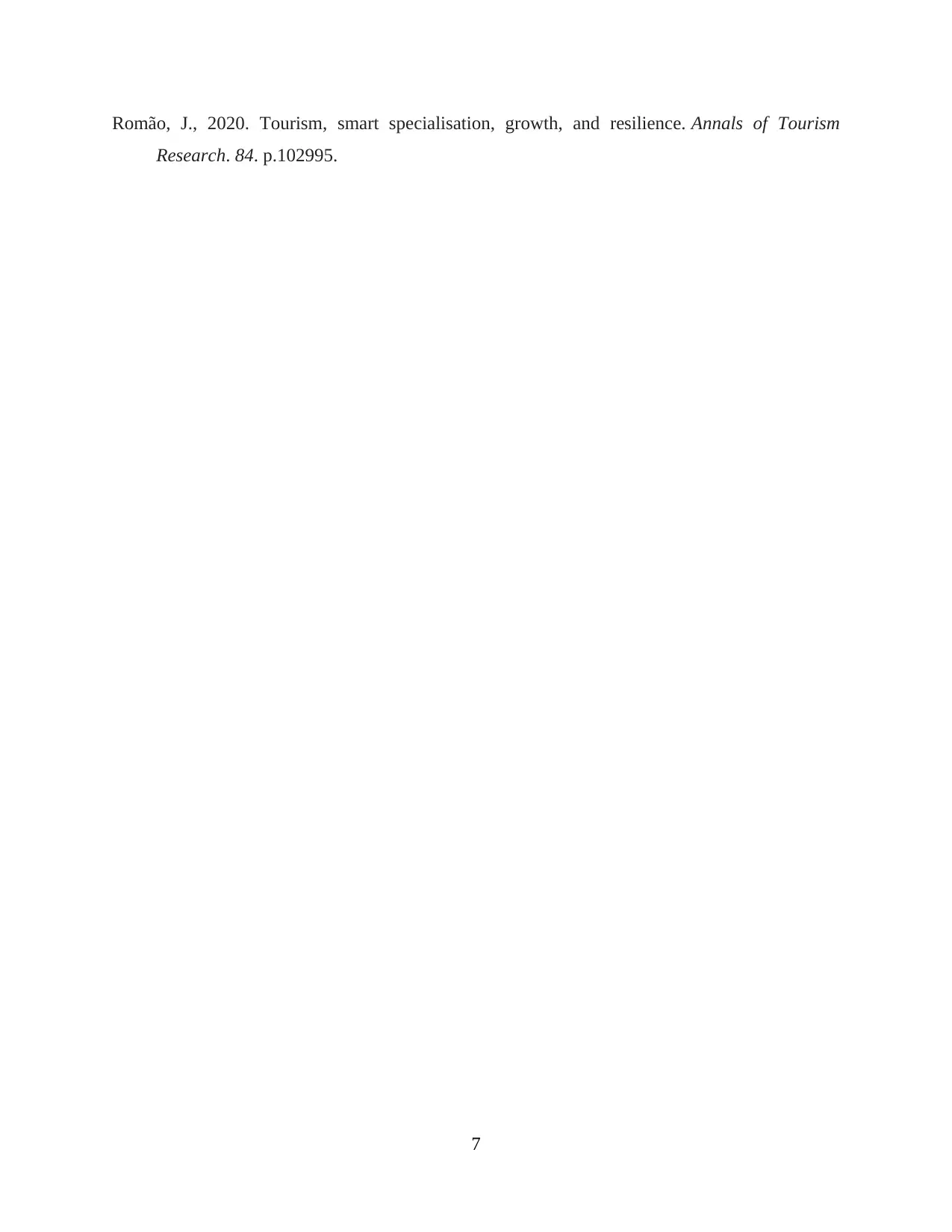
Romão, J., 2020. Tourism, smart specialisation, growth, and resilience. Annals of Tourism
Research. 84. p.102995.
7
Research. 84. p.102995.
7
1 out of 8
Related Documents
Your All-in-One AI-Powered Toolkit for Academic Success.
+13062052269
info@desklib.com
Available 24*7 on WhatsApp / Email
![[object Object]](/_next/static/media/star-bottom.7253800d.svg)
Unlock your academic potential
Copyright © 2020–2026 A2Z Services. All Rights Reserved. Developed and managed by ZUCOL.
